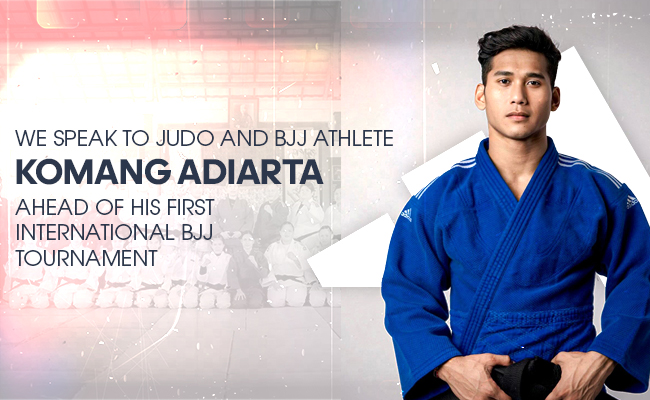Uncategorized
INTERVIEW WITH ADIDAS JUDO ATHLETE KOMANG ADIARTA
How are you preparing mentally and physically for the Ju-Jitsu World Championship 2025 in Bangkok?
As I approach the 2025 World Ju-Jitsu Championships in Bangkok, my mental and physical preparation is my top priority. Mentally, I'm focusing on visualization, meditation, and positive affirmations to build confidence and reduce stress. I'm developing strategies for coping with pressure and maintaining focus during matches. Physically, I'm following an intensive training program that includes strength, agility, and endurance training. I'm also paying attention to nutrition and getting enough rest to ensure my body is in optimal condition. Furthermore, I spar regularly with a variety of opponents to hone my skills and improve my adaptability on the mat.
You’ve represented Indonesia in Judo, and now in Ju-Jitsu — how do you balance your training between the two disciplines?
Balancing Judo and Ju-Jitsu training requires careful strategy. First, I create a structured training schedule, dividing my time proportionally between the two disciplines. I focus on complementary fundamental principles, such as takedowns and locks, that are relevant in both. Furthermore, I utilize cross-training to improve overall physical fitness.
For example, strength training that supports performance in Judo is also beneficial for Ju-Jitsu, and vice versa. Most importantly, I have clear goals for each discipline, allowing me to focus my energy and efforts effectively. With good planning, discipline, and support from my coaches, I am confident I can achieve success in both sports.
What would you say are the biggest differences between Judo and Brazilian Jiu-Jitsu?
The biggest difference between Judo and Brazilian Jiu-Jitsu (BJJ) lies in the primary focus and techniques emphasized. Judo places more emphasis on throwing techniques (nage-waza) and takedowns, with the goal of throwing an opponent onto their back for a quick victory (ippon). Meanwhile, BJJ focuses more on ground fighting and submission techniques such as locks and chokes, which allow practitioners to defeat larger, stronger opponents through the use of technique and leverage. For example, in a Judo match, an athlete will attempt to execute a powerful, clean throw to land an opponent on their back, which will immediately end the match. On the other hand, in BJJ, an athlete might intentionally pull an opponent to the ground to initiate a series of locks or chokes, with the goal of forcing the opponent to tap out.
Do you feel that your Judo background gives you an advantage when competing in Ju-Jitsu or does it make it harder to overcome muscle memory from your years of Judo?
My Judo background has been a huge help in Ju-Jitsu. The fundamental principles of balance, body control, and throws I learned in Judo have provided a solid foundation. There are some adjustments I need to make, especially in terms of ground play, but overall, my Judo experience has given me an edge in terms of movement understanding and strategy.
You come from a family deeply involved in combat sports — how has that influenced your journey and mindset as an athlete?
Growing up in a family close to the martial arts world has had a profound impact on me. From a young age, I was exposed to values such as discipline, hard work, and respect. My family has always been fully supportive, not only in training but also in developing a champion's mentality. They are my primary source of motivation and always remind me to keep learning and improving.
Every athlete has their own mental ritual before stepping onto the mat. What is your mental routine?
Before a match begins, I usually try to calm myself and focus on my goal. I visualize myself executing the techniques perfectly, controlling the match, and achieving victory. I also remind myself of all the hard work and sacrifices I've made to get to this point. This helps me feel confident and ready to face the challenge.
You’ve worn both the Adidas Judo Gi and BJJ Gi — what differences do you notice, and how does each support your performance?
Although the Adidas Judo Gi and BJJ Gi have significant differences, I've learned to adapt to both. The Judo Gi gives me a sense of security and strength, while the BJJ Gi gives me a sense of freedom and agility.
Ultimately, choosing between a Judo Gi and a BJJ Gi comes down to personal preference and the type of training I do. I tend to choose a Judo Gi when focusing on throws and takedowns, and a BJJ Gi when focusing on ground play and submissions. Both are high-quality pieces of clothing that support my performance in different ways.
What does representing Indonesia on an international stage mean to you personally?
Representing Indonesia on the international stage is both an honor and a huge responsibility for me. It's an opportunity to show the world that Indonesia has dedicated athletes capable of competing at the highest level. I feel proud to represent Indonesia and fly the Indonesian flag in the international arena. I also feel a responsibility to give my best and inspire the younger generation of Indonesians to pursue their dreams.
What advice would you give to younger athletes who want to explore more than one combat sport discipline?
My advice for young athletes who want to explore more than one martial arts discipline is to focus on the basics first. Master the foundations of one discipline before trying another. This will give you a better understanding of the basic principles of self-defense and make it easier for you to adapt to different styles. Once you're comfortable with the basics, you can gradually diversify, choosing disciplines that complement each other or have similarities.
After Bangkok, what’s next for you — Judo, Ju-Jitsu, both, or is there another combat sport you’d like to master?
I'm always open to learning new things. After the Bangkok championships, I might explore other martial arts, such as Muay Thai, MMA, Sambo, and others. I believe that each martial art has its own unique qualities and benefits. By learning a variety of disciplines, I can become a more versatile athlete and gain a better understanding of martial arts as a whole.


